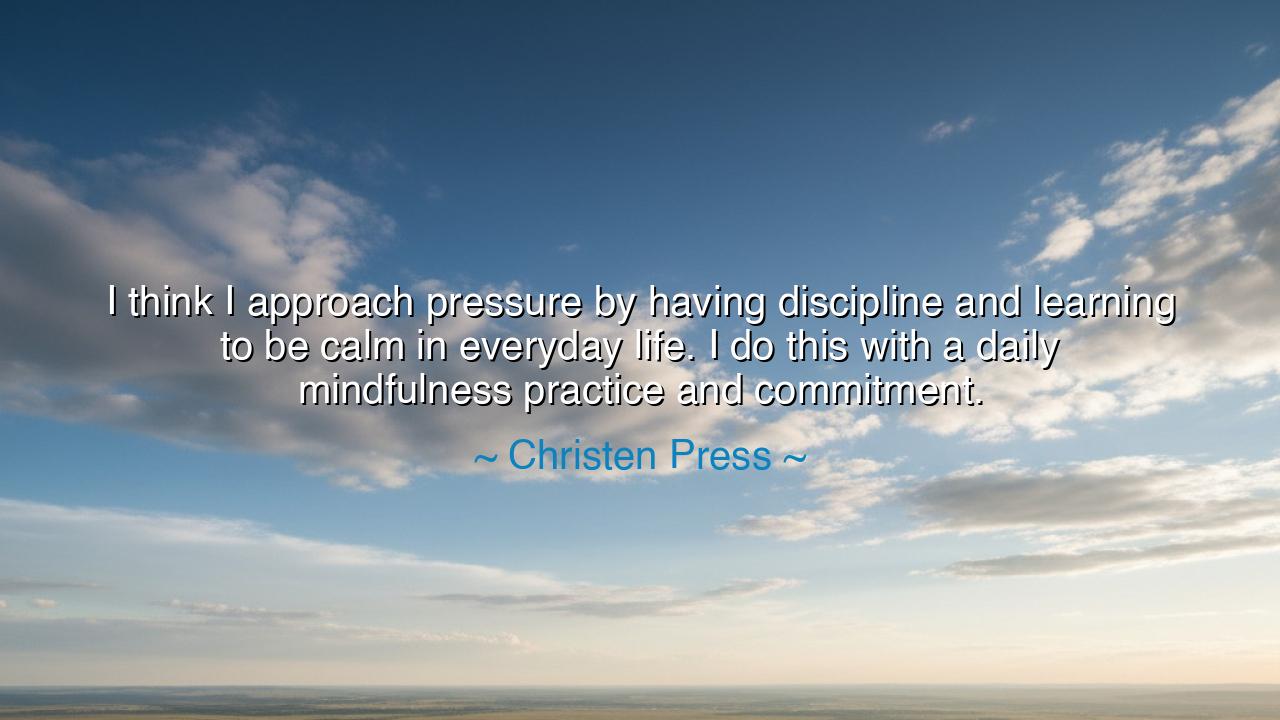
I think I approach pressure by having discipline and learning to
I think I approach pressure by having discipline and learning to be calm in everyday life. I do this with a daily mindfulness practice and commitment.






In the councils of the elders, it was said that storms are faced long before the clouds appear. Christen Press’s confession—“I think I approach pressure by having discipline and learning to be calm in everyday life. I do this with a daily mindfulness practice and commitment.”—is the rebirth of that ancient law. She tells us that the decisive moments are not conquered on the field alone; they are rehearsed at dawn, in small obediences that nobody applauds. Her words braid three cords—habit, attention, and courage—and show how they hold when the wind rises.
To meet pressure, she reaches first for discipline. Not grimness, but a steady arranging of the day so that the mind knows its footing. Discipline is the path that keeps the heart from wandering; it is counting the breath when no one is watching, lacing the boots on time, closing the door to noise so purpose can speak. From repeated small choices a larger strength is born. The athlete becomes a temple whose stones do not rattle when the crowd shouts.
And then there is learning to be calm in everyday life. Calm is not a mood we borrow; it is a craft we practice. We learn it when the kettle boils and someone we love speaks sharply; when traffic locks and we breathe instead of burning; when the list is long and we move one thing, clean and whole, to completion. In this way the ordinary becomes a dojo. Later, when stakes are bright and seconds thin, the body remembers what the kitchen taught: exhale, see the line, do the next right thing.
Her means are plain as water: a daily mindfulness practice and unwavering commitment. Each day she returns to the well—attention anchored to breath, posture to ground, awareness to the present task. This is not magic but millwork: sanding the mind until it takes polish, returning whenever it scuffs. The commitment is the seal: she does it on good days and on gray ones, when victory is near and when it has gone elsewhere. Thus her calm is not borrowed from luck; it is earned.
Consider a story to make the teaching flesh. In 1999, as the Women’s World Cup final stretched to penalties, Brandi Chastain stood at the spot with a nation’s breath upon her. That kick was struck in a stadium—but prepared for in a thousand quiet sessions: repeating the run-up, seeing the net before seeing it, breathing down the noise. She later said the decision to shoot with her left foot was practiced, not improvised; her calm was rehearsed. So too with any craft—surgeons who tie knots in empty rooms, firefighters who crawl blind through training smoke, musicians who dwell with metronomes until time itself loosens its fists. When the hard hour arrives, the body answers with what it has loved daily.
The origin of Press’s wisdom is older than sport. Stoic emperors counting thoughts at daybreak, monks tracing the circle of breath, archers of kyūdō placing the mind in the target before the arrow leaves the string—each discovered that readiness is an echo of routine. Pressure magnifies whatever we have practiced; if we have practiced scatter, we scatter; if we have practiced presence, we arrive.
From this, take a clear lesson for your own journey. Build a small rule that you will keep: five quiet minutes, then ten; one thing done with full attention each morning; a single breath taken before you answer. Write your vow where you will see it—discipline, calm, commitment—and keep it on the dull days, especially then. When fear swells, narrow the world to what is in your hands: stance, breath, first step. In time the storms will still come, but you will find, as Christen Press has found, that the heart you trained in the unnoticed hours will stand like a lighthouse—steady, practiced, and bright—guiding you through the roar.






AAdministratorAdministrator
Welcome, honored guests. Please leave a comment, we will respond soon